According to the ancient Greeks, there were at least six kinds of love: philia, or deep friendship; ludus, or playful love; agape, love for everyone; pragma, long-standing love; philautia, love of self; and, last but not least, eros: sexual love.
You might think you would be hard-pressed to find all six in one place, let alone discover a few more. You would be wrong. Far from the Greek isles, in the midst of our little Island, lies a beautiful country home. There, at the foot of Indian Hill Road in West Tisbury, just past Christiantown Road, sits a horse paddock, an indoor arena, and a couple of old barns, one with firewood neatly stacked beside it and a curious horse extending its head.
A short distance away lies the humble farmhouse that is the seat of the property – a home for family and, at last count, four dogs. A circular driveway leads to another barn used to house some of the horses who board at the farm, plus another shed used to house vehicles. In one stall of the shed lies a boat that was once used to push the tall ship Shenandoah around Vineyard Haven Harbor.
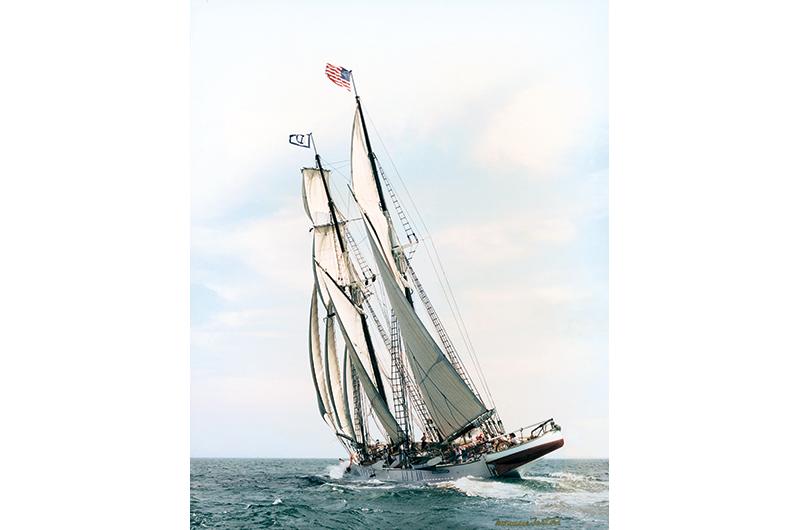
It is there that you might discover the first real clue as to the residents of this place. The horses are the realm of Charlene Douglas, who has employed them to train residents and guests of the Island for more than thirty-five years. The boat hints to the realm of her husband, Captain Robert Douglas – better known to Islanders as the designer and longtime master of the Shenandoah; rescuer and restorer of her sister ship, the Alabama; and the founding force, along with Charlene, of The Black Dog Tavern and The Black Dog Tall Ships enterprises.
The property, with its sprawling fields and outbuildings, has the look of a manor you might find in Feudal times. Indeed, many people on this Island assume that its occupants conduct themselves as the lord and lady of this spit of land. And yet there’s no evidence of downtrodden servants and serfs when you happen by early one morning and watch the day unfold. Instead, the first person you encounter is the farmhand in charge of the grounds and keeping the horse stalls tidy. You wave to him with good morning wishes; he waves back and flashes a healthy smile. It’s clear that he is happy and engaged. Perhaps the Greeks forgot to create a word for love of work.
The next person to appear is the so-presumed lady herself, Charlene. An energetic woman, she emerges from the farmhouse with purposeful strides. She is dressed in the garb of a horseback rider, on her way to the barn to get the day started. You give a warm greeting and she returns the same as if there is no room for anything but joy. Love of place. She heads into the barn that is part of the arena, checking on her loved ones housed there: the horses.
A short while later, a tall man still in bed clothes and a bathrobe emerges from the farmhouse. At first, unexplainably, he cries out in a slightly high pitch, “Baby! Here, baby baby! Baaay Beee! Come on! Baby! Here, baby!” He waits patiently on the steps leading into the house when, all of a sudden, a small white dog appears looking lovingly at him.
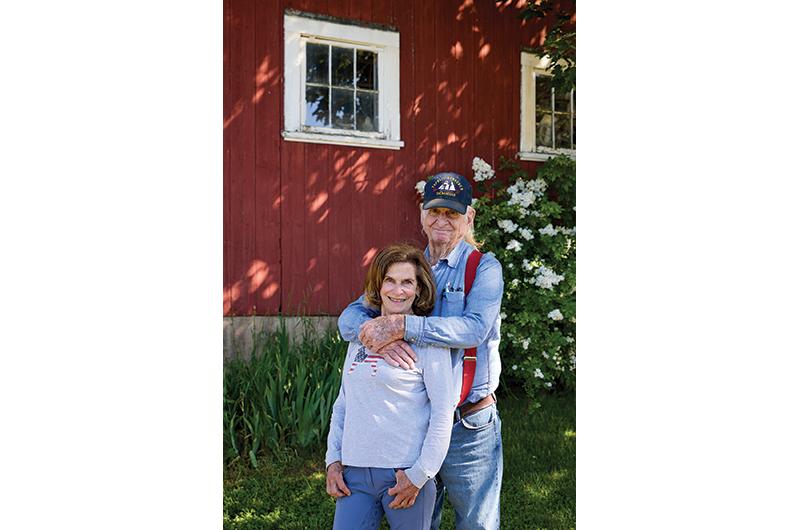
The dog sits, more in expectation than obedience, as the man reaches into his pocket and finds a treat, which he promptly offers to his friend. He is the lord of the manor, Robert Douglas, who is by turns called “Bob” by friends, “the captain” by shipmates, and “Papa,” oftentimes by Charlene. Later in the morning she, too, might use the appellation “the captain” as she walks around looking for Bob. “Have you seen the captain?” she asks. “I think I saw him headed towards the pond with the dogs,” comes the reply. His daily sojourn is to take a walk with the pack around the outskirts of the farm. The Greeks might have missed that word too: love of animals, especially dogs.
Over the years Bob and Charlene have been celebrated for their contributions to life on the Island and have received well deserved accolades. Less has been said, perhaps, about the driving force of all they do: agape, love of everybody. That’s maybe to be expected. They certainly have a private life; there is the inner circle of the immediate family that has grown of late with the arrival of grandchildren. But to say they are stringently private people would be somewhat off the mark. Their extended family is large and comprised of sea captains, deckhands, horse doctors, and folk musicians, to name but some. Bob and Charlene are, in short, the salt of the earth, with a fair bit of sea salt mixed in. The sea, after all, is where their epic tale began.
Before they met, Charlene was a sailor, having started out as a Mariner Girl Scout in her hometown of Padanaram, Massachusetts, a village near New Bedford. She became a deckhand on the tall ship Victory Chimes, perhaps one of the first women in that realm. As chance would have it, while crewing on the Chimes, she encountered Bob, who grew up summering on West Chop where his family had a home. Serendipity was set in motion and a coupling occurred that would come to have a deep influence on the Island and beyond. A stone was tossed in a pond perhaps. To this day, the ripples continue to wash up to shore.
Their coming together was not without challenges. In the early 1960s, while Charlene was on the Chimes at anchor in a port in Maine, Bob was close by, hauling out his boat Ayuthia. The captain of the Chimes was a friend of Bob’s and invited him over for a “mug up” – sailor’s parlance for teatime. Charlene and her then-beau, Billy Bunting (not a bad name for a sailor!), were the deckhands on duty that day, working on cleaning the nether parts of the ship. It was a thankless and dirty job. They were also charged with baking some cookies and providing other sundries in anticipation of their guests’ arrival.
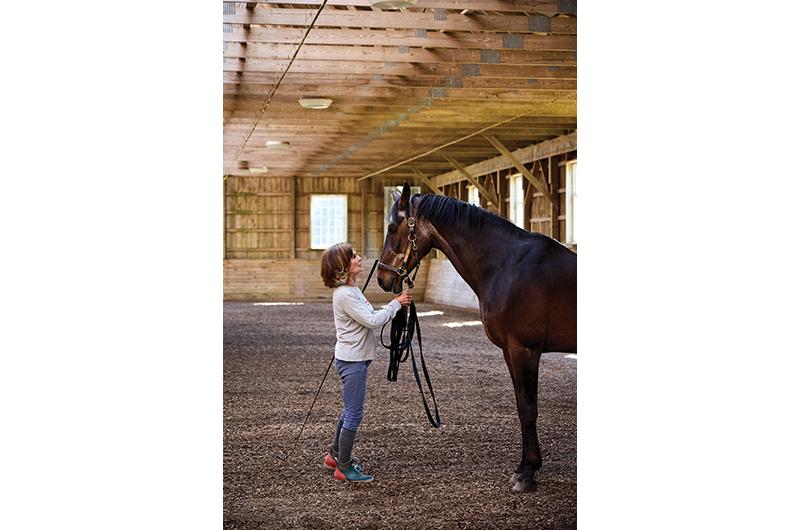
Now, Charlene was every bit a sailor, practically covered with dirt and grease from her efforts. But as she tells it, “I’m not going to get all dressed up! They can take me as I am!” And so she and Bunting served the tea and cookies and returned to their cleaning. Suffice it to say, she was noticed by the guest – the future “Captain Bob,” the future “Papa,” who would later say that he met her when she was “in a galley.”
The next time the two would meet was when Bunting invited Charlene to accompany him to a boatyard, where a friend of his, Bob Douglas, was designing and overseeing the construction of the 108-foot topsail schooner, Shenandoah. Working wooden sailboats had all but disappeared, and Bob had no formal boatbuilding education. But he didn’t care. Fueled by a love of tradition and philautia, a love of what he loved, he modeled his creation off the mid-nineteenth-century revenue cutter Joe Lane. It had no modern amenities: just kerosene lamps, a charcoal stove, and a tight berth. It also had no engine.
Charlene recalled the scene. “We were in the shed where the ship was being built. It was just a frame at that point, and here comes this tall man walking on the planks that stretched along the sides of the frame. He had a red checkered shirt, you know? And I thought, ‘Who is this man?’ An older man, at that!” It was, of course, Bob. It wouldn’t take much time before their fourteen-year difference in age was dispelled as an issue. Pragma, longstanding love, was initiated.
Eventually Bunting and Charlene stopped dating and settled into philia, good friendship. To this day Bob and Charlene speak his name with a fondness. That may be because the ending of that chapter gave Bob and Charlene the opening they needed to pursue what would become an amalgam of all the sorts of love the Greeks described.
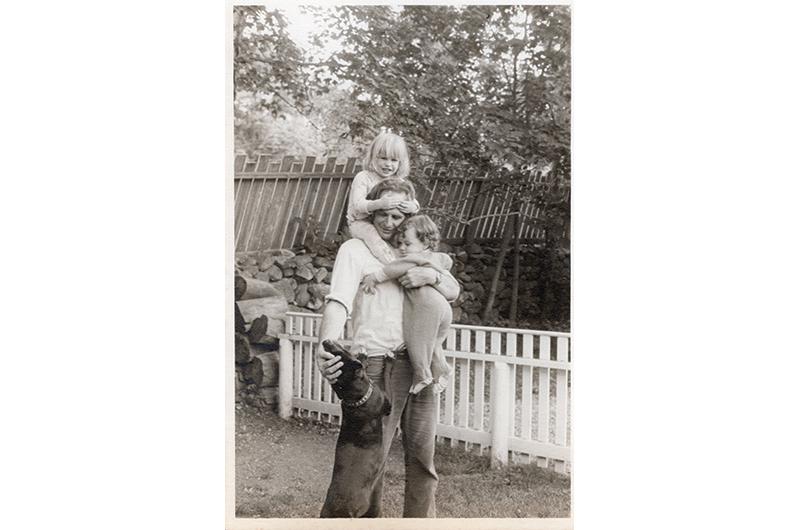
Charlene tells a story of how she was working in Padanaram in 1964 when she saw the Shenandoah far off, engaged in her first season, coming through Quicks Hole from Vineyard Sound into Buzzards Bay. Like the determined soul she is, she dropped what she was doing and hurried home. Arriving there, she asked her mother to bake a pie. She cleaned up and soon made her way to where Bob would be coming ashore. In classic Charlene style, she recounted, “Well, I sat there waiting for him, and when he showed up, I pretended I didn’t notice him. When he approached, I said, ‘Oh, is that you? I didn’t know you were here!’” They were married in 1970. A year later, they opened the Black Dog Tavern on the Vineyard Haven waterfront.
The tavern has since gone on to launch a thousand shirts. Plenty of lore surrounds its origins. But the actual story is quite a bit more humble than what was evidenced years later when the logo T-shirts – each bearing the likeness of Captain Bob’s own dog, named Black Dog after the pirate in Treasure Island – began to appear throughout the world. It turns out Captain Bob just wanted a place to go to for a real New England chowder. Any cook aboard the Shenandoah knows his recipe by heart.
During their early days of marriage, Captain Bob and his bride settled into the home he had purchased on the Island: a captain’s house on the Vineyard Haven Harbor, where he could keep an eye on the ship and muse about the seasons to come. Soon enough, they also began planting the seeds for the next chapter of their lives. You see, before the children arrived, there was another passion they both had, besides the one for each other. This was a love of horses, so obvious today at their home in the hills of West Tisbury. Bob had spent some time out west recovering from rheumatism, where part of his therapy was riding horses. Charlene, for her part, had loved horses since she was a young girl.
“A friend of mine, another little girl from the neighborhood, used to come by on her horse,” she said. “I thought that was so amazing and I wondered if someday I could have a horse.”

Eventually, that someday did come. More to the point, one day Bob said, “Let’s go horse shopping!” According to Charlene, that’s what they did back in the day.
“Oh, Robert,” she said, with perhaps a tinge of practicality, “where would we put it?”
There was a barn on their Vineyard Haven property, which Bob seemed to think would suffice, so off he went. Arriving back home on the harbor later with a broad smile, Charlene immediately began questioning him.
“Oh, Robert, you didn’t. You didn’t buy a horse!” she prodded.
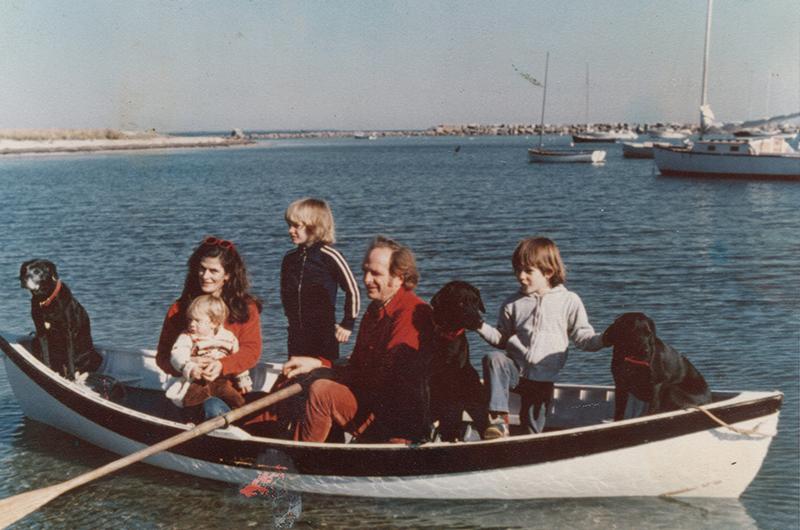
He kept smiling. She proceeded, only somewhat masking her glee: “Oh, Robert, you didn’t buy a horse!”
“No, I didn’t buy a horse,” said Bob. “I bought two!”
Charlene recounted their adventures on horseback in those days. “After we built the Black Dog, we would ride from the Vineyard Haven house down the beach, tie up the horses, and go in for dinner.” That would have been a five-minute trip maximum; the Vineyard Haven house was two doors from Owen Park. “Then we would take rides from the house up-Island, make our way through the trails abutting the state forest, up through West Tis, and then back to Vineyard Haven.”
As their collection of animals grew, so did their family, with their first child being born in 1971. Eventually there were four children: Robbie, Jamie, Morgan, and Brooke. To this day, they are collectively called “the boys” by family and friends. They have all stayed on the Island, and some have started families of their own, so there is a healthy crop of Douglases in the offing. The three eldest, it should be noted, have all married women who personify agape.
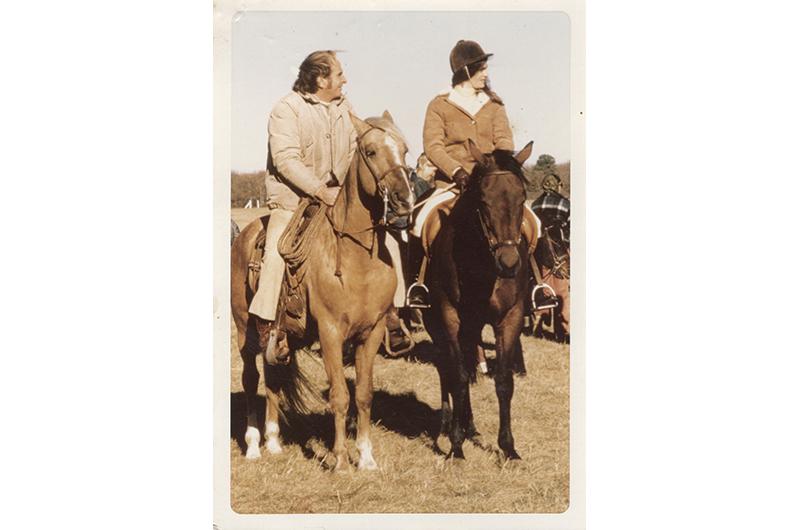
One day in the late ’70s, when the boys were still young, Bob’s brother David came by and mentioned that he knew of a farm for sale in West Tisbury. Arrowhead Farm, as it is known, was owned then by Ronnie and Susie Silva. The thirty-three-acre plot was a well-known part of West Tisbury life, being a vegetable farm where many Island kids worked summers. As it happened, Bob and Charlene, in a positive use of the term, “bought the farm.” But they didn’t move in all at once. They took their time. After all, the house on the harbor had its pleasures.
By 1983, they were pretty much moved in at Indian Hill. They built a riding ring, and Charlene took up teaching equestrian arts. Bob, meanwhile, carried on with his pursuit to give the Island a bit of living history with the Shenandoah. Although he initially envisioned taking adults on week-long charter cruises, over time he transitioned to inviting Island school kids aboard. They weren’t the first kids to man the sails. The young Douglas boys had spent their summers crewing on the ships, crawling up and down and across the rig like monkeys, and harassing the cook whenever possible. After all, ludus (playful love) is a shared family trait.
Charlene might very well be the well spring of this attribute. A sailor is many things, and bawdiness is certainly a trait one can find on vessels of any size. Charlene self-describes as shy, which comes across in public spaces as polite. On a ship, however, she transforms back to her deckhand days. Her playful love was perhaps best displayed after she would spend a week on the Shenandoah, with special friends joining the ship’s complement: Louise, her first mariner scout leader; Gerd, the horse trainer; Harry, the large animal vet; and, perhaps Billy, the singer.
Time is different on a ship. There is romance to be found offshore, but it can also be discovered snug at anchor in Tarpaulin Cove. After the big last-night dinner on-board, the above group would linger in the main salon. Stories would be told, songs sung, and, well, jokes would be offered. All sailors of a sort, there weren’t many rules of decorum. But of all the bawdy joke tellers, who reigned supreme? You guessed it: Charlene! Laughter would waft out of the skylights and the joy would spread amongst the crew.
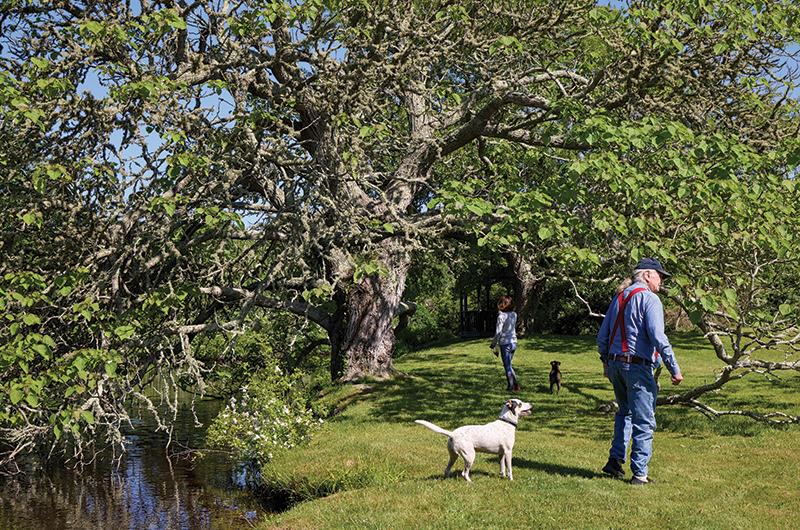
No matter how much time you spend at sea, time does eventually march on. And so it does in this tale. These days, Captain Bob and Charlene don’t get out on the water as often as they used to. In 2020, as Bob approached ninety years old, he and Charlene donated the Shenandoah to two former captains of the vessel: Ian Ridgeway, who, as sailors say, “came up through the hawsepipe,” and Casey Blum, the first woman to go through all the ranks from galley person to captain. The mission of their budding foundation – Martha’s Vineyard Ocean Academy – is to continue educating with an eye eventually to build a new Shenandoah, sheathed in steel and bearing an engine that can support taking crews offshore.
During that same year, Bob and Charlene sold their beloved Arrowhead Farm, at a fraction of its potential cost, to the Martha’s Vineyard Land Bank Commission, ensuring it will remain a working Island farm. The deal allowed them to maintain life rights, so for now everything continues apace. Charlene continues to tend to her horses and the stream of workers and Island kids. Bob continues to walk his dogs. He spends most of his day in the little office on the waterfront next to the tavern and wharf, where nearby T-shirts, sweatshirts, and towels sell at a rapid pace. But down on the harbor, or in the fields of West Tisbury, the stream of visiting friends and ship captains and horse doctors and deckhands who know them best don’t talk about such things. They exchange jokes and old stories and ask about horses and tides. They rarely talk about love, in any of its forms. Some things need no words to express.
Besides, sailors have always been more prone to bawdy jokes than sappy declarations, and Charlene is the bawdiest of them all. After spending the day with me and patiently responding to a litany of queries, she looked visibly relieved.
“Well, so, that was a lot of questions!” she exclaimed. “But there’s one thing you didn’t ask about!”
“What’s that?” I asked.
“Sex!” she replied with the hearty laugh of a sailor.
Eros! So the list was complete.

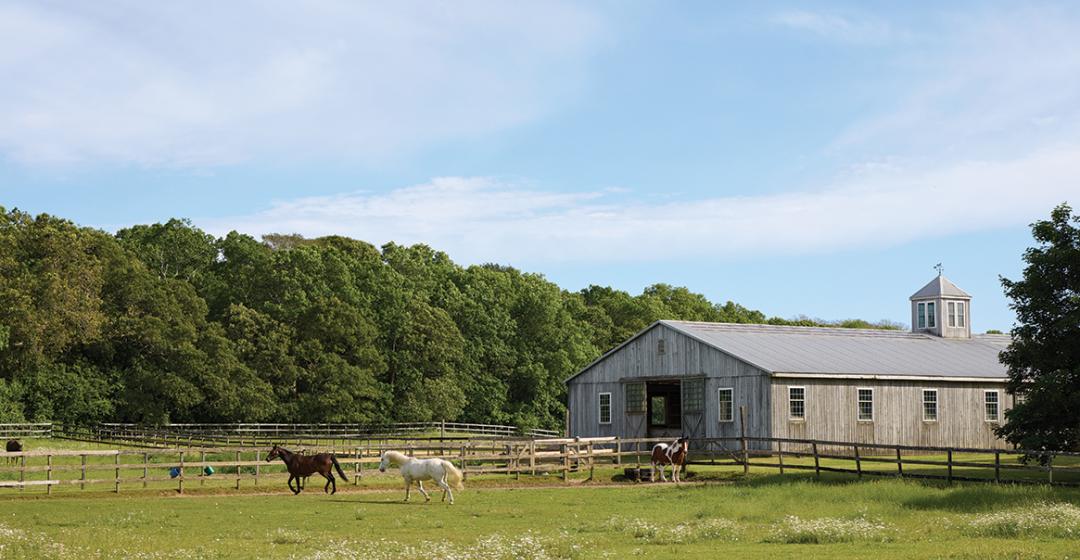


 2 comments
2 comments
Comments (2)